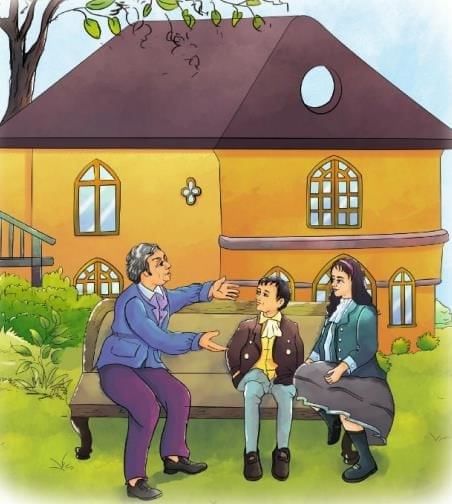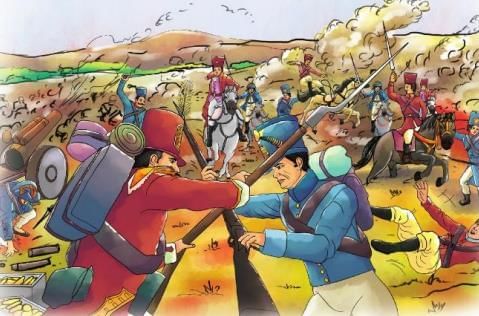Summary: After Blenheim | English Class 4 ICSE PDF Download
| Table of contents |

|
| Introduction |

|
| Key Points of the Poem |

|
| Summary |

|
| Message |

|
Introduction
"After Blenheim" is a poem by Robert Southey that tells a simple yet thought-provoking story about an old man, Kaspar, and his two grandchildren, Peterkin and Wilhelmine. The poem is set after a famous battle called the Battle of Blenheim. Through a conversation between Kaspar and the children, the poem explores the idea of war and its effects. It uses simple language to make young readers think about the reasons for fighting and the sadness it brings.
Key Points of the Poem
- The poem talks about a historical battle between the English and the French.
- It shows an old man, Kaspar, explaining the war to his grandchildren.
- It questions the purpose and benefits of war.
- It highlights the sadness of losing lives in the battle.
Summary
Stanza 1
It was a summer evening;
Old Kaspar's work was done,
And he before his cottage door
Was sitting in the sun;
And by him sported on the green
His little grandchild Wilhelmine.
It was a calm summer evening. An old man named Kaspar had finished his work and was relaxing outside his house in the sunlight. His young granddaughter Wilhelmine was playing happily nearby on the grass. The scene was peaceful, but it hinted at a serious event from the past.

Stanza 2
She saw her brother Peterkin
Roll something large and round,
Which he beside the rivulet
In playing there had found.
He came to ask what he had found,
That was so large and smooth and round.
Wilhelmine noticed her brother Peterkin rolling a big, round object he found while playing near a small stream. He brought it to Kaspar to ask what it was because it looked large, smooth, and round. This discovery sparked their curiosity about its origin.
Stanza 3
Old Kaspar took it from the boy,
Who stood expectant by;
And then the old man shook his head,
And with a natural sigh,
"Tis some poor fellow's skull, said he,
'Who fell in the great victory.
Kaspar took the object from Peterkin, who was waiting eagerly. Kaspar shook his head sadly and said it was the skull of someone who died during a big battle that was called a victory. This moment made the children realize the seriousness of what they had found.
Stanza 4
'Now tell us what 'twas all about,'
Young Peterkin, he cries;
And little Wilhelmine looks up
With wonder-waiting eyes;
'Now tell us all about the war,
And what they fought each other for?'
Peterkin asked Kaspar to explain what the battle was about. Wilhelmine looked up at Kaspar with curious and excited eyes, also wanting to know about the war and its reasons. Their innocent questions showed their interest in understanding the past.
Stanza 5
'It was the English,' Kaspar cried,
'Who put the French to rout;
But what they fought each other for,
I could not well make out;
But everybody said, quoth he,
'That 'twas a famous victory.
Kaspar told them that the English defeated the French in the battle. He was unsure why they fought but said everyone called it a famous victory. This part showed that even Kaspar didn’t fully understand the purpose of the war.

Stanza 6
'And everybody praised the Duke
Who this great fight did win.
'But what good came of it at last?'
Quoth little Peterkin.
'Why, that I cannot tell,' said he;
'But 'twas a famous victory.
Everyone praised the Duke who won the battle. When Peterkin asked what good came from it, Kaspar admitted he didn’t know but repeated that it was called a famous victory. This left the children with more questions about the value of such wars.
Message
The poem teaches us to think about the sadness and pointlessness of war, especially when many innocent people lose their lives without a clear benefit. It encourages us to discuss and understand the true cost of fighting.
New Words with Meanings
- Sported: Played happily.
- Rivulet: A small stream of water.
- Expectant: Feeling excited that something good might happen.
- Fell: Died (used here for someone who passed away in battle).
- Wonder-waiting: Waiting with a feeling of curiosity or amazement.
- Rout: A complete defeat or retreat.
- Quoth: An old way of saying "said."
FAQs on Summary: After Blenheim - English Class 4 ICSE
| 1. What is the primary theme of the poem "After Blenheim"? |  |
| 2. Who is the author of the poem "After Blenheim," and what is significant about their background? |  |
| 3. How does the poem depict the impact of war on children and families? |  |
| 4. What literary devices are used in "After Blenheim" to enhance its message? |  |
| 5. In what ways does the poem challenge the traditional views of war and heroism? |  |



















